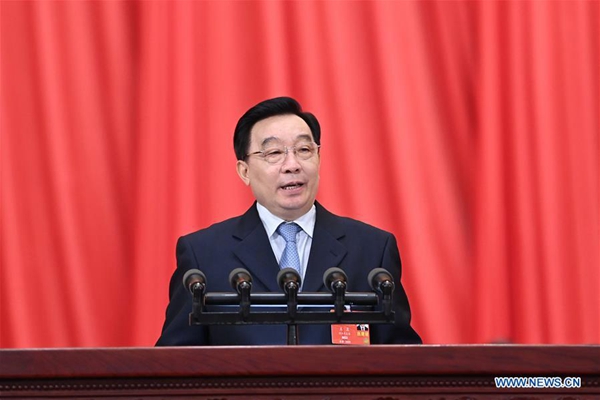Draft decision on HK national security legislation submitted to NPC
 0 Comment(s)
0 Comment(s) Print
Print E-mail Xinhua, May 22, 2020
E-mail Xinhua, May 22, 2020

A draft decision on establishing and improving the legal system and enforcement mechanisms for the Hong Kong Special Administrative Region (HKSAR) to safeguard national security was submitted to China's national legislature for deliberation on Friday.
Wang Chen, vice chairman of the Standing Committee of the National People's Congress (NPC) explained the draft decision to the third session of the 13th NPC, which runs from May 22 to 28.
Since the return of Hong Kong to the motherland, China has been firmly implementing the principles of "one country, two systems," "the people of Hong Kong governing Hong Kong," and a high degree of autonomy, Wang said.
The practice of "one country, two systems" has achieved unprecedented success in Hong Kong, he said.
But the increasingly notable national security risks in the HKSAR have become a prominent problem, the vice chairman said, citing activities that have seriously challenged the bottom line of the "one country, two systems" principle, harmed the rule of law, and threatened national sovereignty, security and development interests.
Law-based and forceful measures must be taken to prevent, stop and punish such activities, he noted.
Article 23 of the Basic Law of the HKSAR stipulates that the HKSAR shall enact laws on its own to prohibit any act of treason, secession, sedition, subversion against the Central People's Government, or theft of state secrets, to prohibit foreign political organizations or bodies from conducting political activities in the HKSAR, and to prohibit political organizations or bodies of the HKSAR from establishing ties with foreign political organizations or bodies.
More than 20 years after Hong Kong's return, however, relevant laws are yet to materialize due to the sabotage and obstruction by those trying to sow trouble in Hong Kong and China at large, as well as external hostile forces, Wang said.
Considering Hong Kong's situation at present, efforts must be made at the state-level to establish and improve the legal system and enforcement mechanisms for the HKSAR to safeguard national security, to change the long-term "defenseless" status in the field of national security, Wang said.
This will advance the institutional building to safeguard national security on the course of China's Constitution and the Basic Law of the HKSAR, he said.
This will also strengthen the work of safeguarding national security and ensure the steady and enduring growth of the cause of "one country, two systems", he added.
Wang elaborated on the following basic principles:
-- Firmly safeguarding national security;
-- Upholding and improving the "one country, two systems";
-- Adhering to governing Hong Kong in accordance with the law;
-- Resolutely opposing external interference;
-- Substantially safeguarding the legitimate rights and interests of Hong Kong residents;
The draft decision consists of an introduction and seven articles, according to Wang.
Article 1 states clearly that the country will unswervingly, fully and faithfully implement the principles of "one country, two systems," "the people of Hong Kong governing Hong Kong," and a high degree of autonomy; stresses taking necessary measures to establish and improve the legal system and enforcement mechanisms for the HKSAR to safeguard national security, as well as prevent, stop and punish activities endangering national security in accordance with the law;
Article 2 states clearly that the country resolutely opposes the interference in the HKSAR affairs by any foreign or external forces in any form and will take necessary countermeasures;
Article 3 specifies that it is the HKSAR's constitutional responsibilities to safeguard national sovereignty, unity and territorial integrity; stresses that the HKSAR must complete the national security legislation stipulated in the Basic Law of the HKSAR at an earlier date and HKSAR's administrative, legislative and judicial organs must, in accordance with relevant laws and regulations, effectively prevent, stop and punish acts endangering national security;
Article 4 specifies that the HKSAR must establish and improve the institutions and enforcement mechanisms for safeguarding national security; when needed, relevant national security organs of the Central People's Government will set up agencies in the HKSAR to fulfill relevant duties to safeguard national security in accordance with the law;
Article 5 specifies that the HKSAR chief executive must regularly report to the Central People's Government on the HKSAR's performance of the duty to safeguard national security, carry out national security education and forbid acts of endangering national security;
Article 6 specifies the constitutional meanings of related legislation of the NPC Standing Committee:
(1)Entrusting the NPC Standing Committee to formulate relevant laws on establishing and improving the legal system and enforcement mechanisms for the HKSAR to safeguard national security. The NPC Standing Committee will exercise its functions and powers of legislation under authorization;
(2)Specifying that relevant legal tasks for the NPC Standing Committee are to effectively prevent, stop and punish any act occurring in the HKSAR to split the country, subvert state power, organize and carry out terrorist activities and other behaviors that seriously endanger national security, as well as activities of foreign and external forces to interfere in the affairs of the HKSAR;
(3)Specifying the method of implementing relevant laws of the NPC Standing Committee in the HKSAR, that is, the NPC Standing Committee makes the decision to include relevant laws into Annex III of the Basic Law of the HKSAR, and the HKSAR promulgates and implements them;
Article 7 specifies that this decision shall go into effect as of the date of promulgation.
After the issuance of the decision, the NPC Standing Committee will work with related parties to formulate relevant laws at an earlier date for the HKSAR to safeguard national security, actively push for settling prominent problems in the national security system of the HKSAR, strengthen the building of special institutions, enforcement mechanisms and law enforcement forces, so as to ensure relevant laws' effective implementation in the HKSAR, Wang said.





